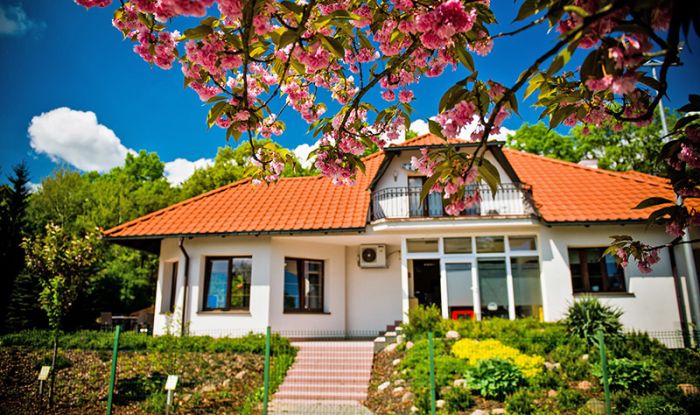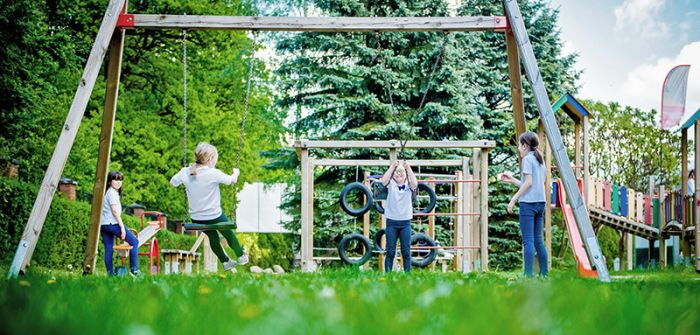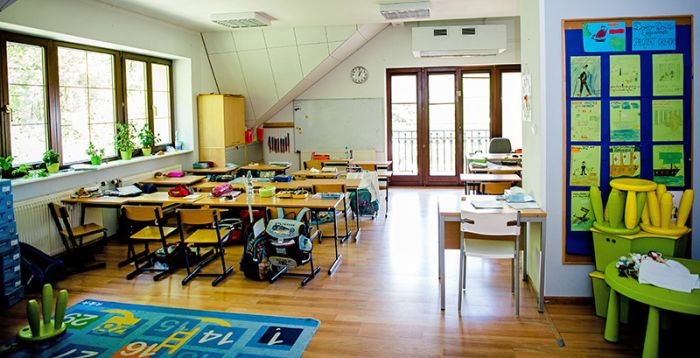On this page:
- Two curricula
- Teachers
- Students
- Graduates
- Special character of the school
- Facilities and resources
- Achievements
- Difficulties and challenges

Anna Rokicka is the principal of the International school, and has worked there since 2019. Previously she was the coordinator of the Canadian program and now she combines these two responsibilities.
Two curricula
Our Kids: Why did you choose the Canadian curriculum?
Anna Rokicka: Our school started 15 years ago with the preschool. The owners were trying to decide what it should be like, and it was clear to them that the profile should reflect the changing educational needs of the modern world. They decided to focus on bilingualism and multilingualism. The next step was the choice of a curriculum. The decision to choose the Canadian curriculum was not a coincidence.
By that time, there were already a few schools which used British and American curricula, but the owners were looking for a curriculum which would be particularly suitable for bilingual children. They considered the Canadian approach the most appropriate fit to their vision of our school.
A big role in the choice of this program and in creating the school mission was played by our first program director, the president of a teaching College in Ontario, who shared with us many tools, ideas, and methods. She had worked in the system for many years and had extensive experience both in teaching and in working with teachers. Her vast experience was in fact a lot more valuable than just visiting Canada to confirm the choice was right.

Our Kids: Are you the only school which offers the Canadian curriculum?
Anna Rokicka: In Warsaw, there are both preschools and schools with the Canadian profile, but I think we’re significantly different from them. Our teaching is based on both the Polish and Canadian curricula, which we combine in the optimal way. Both are equally important. Our school is called an international school, and this name reflects our holistic, multidisciplinary approach to education.
Our Kids: How do you implement two curricula logistically?
Anna Rokicka: In our school, students from Grade zero to Grade 8 have exactly the same number of hours. We start our day at 8:45, like in Canada, and finish after seven hours, at 3:25 pm. This means younger children have a longer school day than elsewhere. We begin each day with the Polish curriculum and finish with the Canadian curriculum, and the following day is the opposite. We decided to introduce longer hours at such an early age to develop solid language skills in our children. Language in our school is a tool we use for other purposes. This is why in the first year we pay a lot of attention to developing linguistic skills, so that later, in higher grades, children can achieve a lot more.
Teachers
Our Kids: Who are the teachers in your school?
Anna Rokicka: All our teachers have high qualifications and a lot of experience. but there is one more thing which is the most important. We surround ourselves with passionate teachers, because, in my opinion, a person who’s passionate about what he or she does always spreads that passion around. It’s contagious. The mission of our school is instilling in our students a passion for learning. Not just for the eight years they’re with us, but for their whole life. We carefully select teachers, and we always look for teachers with passion.
The Polish curriculum it is run by highly qualified Polish teachers.
In our Canadian program, we employ native speakers, mostly from Canada and the United States. These are teachers with full teaching qualifications and international experience. For us, it’s crucial the teachers have gone through the Canadian or a similar system. Most often these are young, very devoted teachers.
We recruit them specifically for our school. We don’t use the Warsaw pool of native speakers who have been here for years, but we search for teachers specifically for our school. We sign a contract with them for one year, which gives us an opportunity to get to know each other, and to see how they do in a new situation. After that one year, if both sides are still interested, we sign longer contracts. Some teachers stay with us for five years.
In both programs, we have 35 to 40 teachers.

Our Kids: We often hear how difficult it is to retain teachers and how high the turnover in school faculty usually is. What is the situation in your school?
Anna Rokicka: Well, after the big changes in the Polish educational system, this is definitely something we’ve observed. For many years, we had a very stable faculty team, but since middle schools have been eliminated, we’ve had to introduce some changes. It’s not easy to retain teachers, especially with our location. Our school is located just by a forest—Kabacki Forest. This is a beautiful place, but it’s not easy to get there from another part of the city, although some of our teachers have been doing this for years.
Students
Our Kids: And who studies in your school?
Anna Rokicka: Due to the profile of our school and our emphasis on the Polish program, we usually have students who come from families that have decided to stay in Poland for a longer period of time—long enough to make it necessary for their children to study Polish. Therefore, most of our students come from Polish families or bilingual families, where parents’ work forces them to move quite often. We provide them with certainty that if they get a new contract and need to leave again, their children will be able to join any English-language program in the world.
The word “international” in the name of our school is really a message to the parents that we prepare our students to be able to start their education at any stage outside Poland.
Graduates
Our Kids: Where do your students usually land after they graduate?
Anna Rokicka: Most of them continue their education in international schools. When middle school was still around, everything was very smooth, because we prepared our graduates to continue their education in Poland or abroad. Now, after the reform, a lot of new high schools appeared, and others have also expanded their offerings. This is the time to verify our work methods. We’ll continue to observe the situation very carefully and to draw conclusions from the changes that the Polish educational reform has caused.
We do need to constantly grow and develop. We’re getting ready to develop one of our campuses, so who knows: maybe in a few years we’ll have our own high school using the Canadian curriculum?

Special character of the school
Our Kids: In what way is your school different from others?
Anna Rokicka: The most important distinguishing factor of our school is education at the highest world level, while at the same time preserving the small scale of this place. It’s a small school on the outskirts of Warsaw, which means we know our students very well, as well as their parents and all their needs and problems. The proof of our very high level is that the teachers of the Canadian program come specifically to our school, and if they stay longer in Poland, the reason is to be with us and our students.
Our work with our students has three aspects which are extremely important to us: academic, social, and civic. We work hard to develop all the three of them.
Facilities and resources
Our Kids: You have two buildings. Why?
Anna Rokicka: When we started 15 years ago, we rented a building, but at some point we decided we wanted to be on our own, and this is how the idea of the building in Jagielska Street came about. At first, it housed all the elementary school classes, but with time, when our brand and popularity grew, we garnered more and more interested students, and we felt it would be a good idea to separate the younger and the older students. The two buildings are different, reflecting the different needs of children at different ages. We have great resources, equipment, extra materials, and support for the teachers and their professional development purposes, because we believe that a good teacher with great resources can work wonders.
Our Kids: How many students do you have in both buildings?
Anna Rokicka: 160. Each class has a maximum of 18 students. In the buildings for our younger students, we have full classes, so we have a co-teacher (a dedicated assistant) and a supporting teacher with full teaching qualifications. In the school for older students, we also have a maximum of 18 students in class, but sometimes the classes aren’t full, so there can be as few as 15 to 16 students.
Achievements
Our Kids: What are you most proud of? What are your most significant achievements?
Anna Rokicka: We’re very proud and happy about our academic achievements. Despite implementing two different curricula, we always place at the top in the rankings of the best schools. We had excellent results in Grade 6 exams when the elementary school was still only six years. Now, after the middle school has been eliminated, we are in the transformational phase, so it’s hard to talk about those most recent results and hard to interpret them at this stage. I can only say that our first graduates who last year finished Grade 8 elementary school all got into the high schools of their first choice.
The reason to be proud and happy is also that with such small classes we have the opportunity to influence not only the education but also the development of children. We have time to stop and reflect.
We’ve introduced a highly individualized evaluation system. In our school, we have self-evaluation cards, peer evaluation cards, as well as teacher evaluation cards. We talk a lot with our students, because we want them to be very conscious of everything that’s happening around them. I think this is very unique, and it allows time and space for something extra.
Selecting the best teachers makes us special. We have people for whom it’s extremely important to be able to influence many aspects of the development of their students and to be involved in important situations and experiences in their students’ lives.
Difficulties and challenges
Our Kids: And what are the biggest challenges?
Anna Rokicka: Sometimes it’s the relationships with the parents, and this is for a very simple reason—the lack of time that all of us suffer from.
People who read this also viewed:
- Warsaw private schools
- Kraków private schools
- Poznań private schools
- Wrocław private schools
- Łódź private schools
- Rzeszów private schools
- Gdańsk & Gdynia private schools
-
Advice Guide
- ABC of educational terminology: Glossary of terms and concepts
- The admissions process
- Advantages and disadvantages of studying in an international school
- The application process
- Benefits of Polish private schools
- Bilingual schools
- Boarding schools
- Choosing a private or nonpublic school in Poland
- Compare schools in Poland
- English schools in Warsaw
- Homeschooling
- International schools in Kraków
- International schools
- Private school interviews
- Music education
- Myths about private education
- Non-public schools in Poland
- School open houses
- Our Kids Interview: Get to know EF Academy Oxford
- Our Kids Interview: Get to know Open School
- Our Kids interview: Get to know Regent College International Schools
- Our Kids Interview: Get to know The American School of Warsaw
- Our Kids Interview: Get to know The British School Warsaw
- Our Kids Interview: Get to know Wrocław Cosmopolitan School (two interviews, new video)
- Poland school profiles
- Private day schools
- Gifted schools & programs
- Private Jewish schools in Poland
- Language schools
- Private school tuition and costs in Poland
- Private schools in Poland
- Private schools in Poland offering French-language immersion
- English immersion schools
- Poland school uniforms
- Private special needs schools in Warsaw
- Public versus non-public schools in Poland
- Private school questions
- Private school rankings
- Reasons for choosing private schools - Our Kids’s survey report
- Religious schools
- Schools and classes for children with ADHD in Poland
- Social primary schools
- Social Schools
- Special educational needs (SPE) certificates
- Special needs schools
- Study abroad at a private school
- The first annual non-public school fair in Poland
- The first annual Our Kids non-public school expo in Warsaw was a great success
- Third Private School Expo in Warsaw - summary
- Types of schools
- Types of schools in Warsaw
- Warsaw preschool costs
- Why private school?
- Why parents go private
-
Grades
- Boarding high schools
- Choosing a high school in Poland
- Mokotow High School Campus - a new Warsaw high school and Thames British School campus
- Montessori nursery schools
- Montessori preschools
- Our Kids Interview: Get to know English Montessori School Katowice
- Our Kids Interview: Get to know FSA School
- Our Kids Interview: Get to know KIDS & Co.
- Our Kids Interview: Get to know Polish British Academy of Warsaw
- Our Kids Interview: Get to know The English Playhouse and The English Primary
- Poland education: grade levels
- Preschools in Warsaw
- Private & non-public preschools
- Private & non-public primary schools
- Private bilingual elementary schools in Warsaw
- Private high schools
- Private high schools in Warsaw
- Private middle schools
- Nursery schools
- Private primary schools in Warsaw
- Social high schools
-
Locations
- Boarding schools in Warsaw
- English schools in Kraków
- International Baccalaureate (IB) schools in Warsaw
- International schools in Warsaw
- Montessori schools in Warsaw
- Non-public schools in Warsaw
- Our Kids Interview: Get to know EF Academy
- Our Kids interview: Get to know Excellence in Education better
- Our Kids Interview: Get to know PRIMUS Non-Public Primary School No. 47 and Non-Public Secondary School
- Our Kids Interview: Get to know the Canadian School of Warsaw
- Our Kids Interview: Get to know The Primary and Secondary Schools of the Sisters of Nazareth in Warsaw
- Private Catholic and Christian schools in Warsaw
- Private day schools in Warsaw
- Private language schools in Warsaw
- Private schools in Bialystok
- Bydgoszcz schools
- Częstochowa schools
- Private schools in Gdańsk & Gdynia
- Katowice schools
- Private schools in Krakow
- Lublin schools
- Olsztyn schools
- Private schools in Poznań
- Private schools in Rzeszów
- Szczecin schools
- Private schools Warsaw
- Private schools in Wrocław
- Zielona Góra schools
- Private schools in Łódź






 POL
POL CAN
CAN